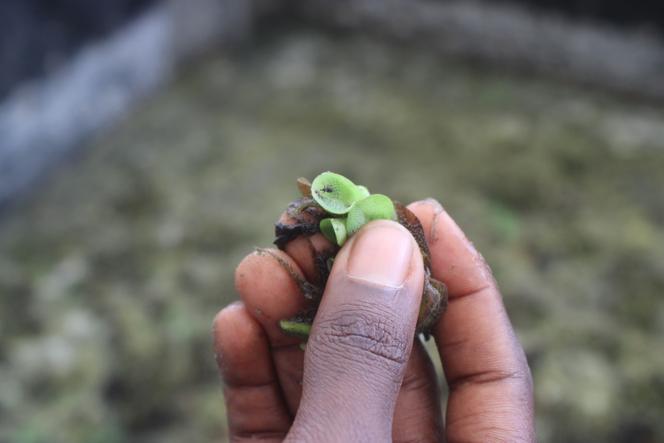


Sadam Ekwalla is tired, but happy. Smiling broadly, the 33-year-old fisherman moored his small wooden pirogue boat on the shores of Lake Ossa, in Dizangué, in western Cameroon. Out at 4 am, he's back after more than six hours on the water with a fine harvest of pink carp, some of which will go on sale and the rest to his family. "I'm really happy. We went through some tough years when we couldn't fish," he said as he untangled his net. "Salvinia had invaded everything. The lake was like a soccer stadium lawn. You couldn't see the water and you couldn't do anything. Today, some of this cursed plant has disappeared."
According to Ekwalla and eight other fishermen interviewed by Le Monde, it all began between 2016 and 2017. The sailors saw the appearance of Salvinia molesta, a highly invasive aquatic fern that doubles in size every eight to 10 days, on this 4,507-hectare freshwater lake that is home to African manatees, marine mammals classified as vulnerable on the International Union for Conservation of Nature (IUCN) list of endangered species.
"We'd pass an area and the next day the whole place would be full of Salvinia. We'd cast out our nets and a few hours later it had swallowed everything," said Ernest Djocky, 53. "I lost two nets, that's nearly 200,000 CFA francs [300 euros]. We couldn't even see the manatees anymore." The situation was such that fishing became impossible, as the pirogues could no longer make their way through. Some fishermen left the area, in search of new sites. Others, like Ekwalla, turned to motorbike-taxis or farming.
The villages bordering the lake organized clean-up days to get rid of this plant, which they nicknamed "Boko Haram," "Satan 2" or "the Devil", but very quickly, Salvinia covered up to 50% of the lake. "Even the banks were under attack. It was unheard of," Djocky said. "Fortunately, thanks to Dr. Aristide's weevils, there's been an improvement."
Faced with the proliferation of the fern, Aristide Takoukam Kamla, marine biologist and founder in 2012 of the African Marine Mammal Conservation Organisation (AMMCO), an NGO specializing in the protection of marine species in Cameroon, decided to take action in 2019. At the time, he was completing his veterinary doctorate with a specialization in the African manatee at the University of Florida in the United States. This scientist, who had "fallen madly in love" with the marine mammals of Lake Ossa during his studies in ecology at the University of Dschang (west Cameroon), noticed that the Salvinia was proliferating due to the lake's enrichment in nitrogen and phosphorus.
"These are elements that plants need to feed themselves," he said. "Since Salvinia is a floating plant, it depends on the nutrients in the water. As long as the water is enriched, it thrives, but if the water loses its enrichment, it dies. I didn't want to give up and let the lake die. I would never have forgiven myself."
After obtaining his doctorate in Florida in 2019, he flew to the University of Louisiana to train with partners specializing in the breeding of weevils that feed on ferns. "I was convinced that biological control was the method to use," he said. "It had already produced results elsewhere, in 22 African countries" including Senegal, Benin and South Africa. The Cameroon government authorized him to import these insects. In his small laboratory in Dizangué, he experimented by collecting Salvinia from Lake Ossa, which he placed in contact with weevils in artificial ponds. The results were positive. Satisfied, in 2021 the state issued him with a permit to release the weevils back into the lake.
But results were slow in coming, and the population was getting impatient. Kamla and his team were worried: They had the impression that the weevils they were spraying were disappearing. They asked themselves questions, talked to their partners in Louisiana and changed their method. The insects were now released into suitable enclosures. "They stayed together long enough to reproduce and acclimatize to the lake environment," said the biologist. By the end of 2022, the results were in. The Salvinia had changed color to brown. The clumps were perforated by swarms of weevils and had disappeared from the surface of the water.
"Communities have understood that biological control is the solution," said Kamla. "We've gone from 50% Salvinia coverage in 2021 to almost 15% today. Fishing has resumed and manatees are increasingly visible in the lake." But the fight isn't over, as Salvinia has created an environment conducive to the proliferation of another invasive plant: Rhynchospora racemosa. They make a resilient duo requiring considerable financial and material resources. In the meantime, the most urgent task, according to the biologist, is to find the causes of the nitrogen and phosphorus enrichment of the water from the Sanaga, Cameroon's longest river.
For their part, fishermen and locals are "praying that Salvinia will disappear forever," said Noé Bessinga, chief of Songueland, a lakeside village: "This plant has caused us all kinds of harm. Fishermen have abandoned their camps, and farmers have abandoned their fields on the other side of the lake because they could no longer access them." But with fishing activities back on track, conservationists now fear another scourge, of which man is the sole culprit: the resumption of manatee poaching.
Translation of an original article published in French on lemonde.fr; the publisher may only be liable for the French version.
